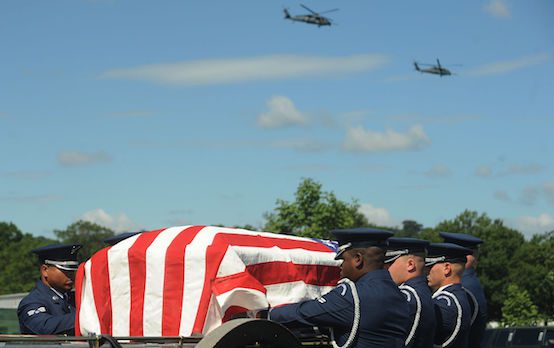We Must End the Endless Wars

The Trump administration’s Syria envoy, Jim Jeffrey, wants you to know he is unhappy with all of the criticism of endless wars:
“I could go on literally for 20 minutes with literally scores and scores of American military operations that have undergird this global security regime and thus undergird the American and Western and UN values system. You start pulling the threads on that by claiming that every single time we threaten to fire a Tomahawk missile we are getting another Vietnam or another Iraq — please indicate that I’m stamping my fist on the table as I’m doing this — we are asking to go back to the 1930s. That’s the echo of what I hear in these comments, the 1930s.”
It is amusing that Jeffrey complains about criticism of endless wars because he thinks “this shows total ignorance of what’s going on in the world today” when it is Jeffrey who seems to be ignorant of what the critics are talking about. The U.S. is currently conducting military operations in war zones in at least six countries. U.S. forces are still fighting and dying in Afghanistan more than 17 years after 9/11. The U.S. is illegally involved in hostilities in Yemen as part of the Saudi coalition war there. The current administration came very close to triggering a new, illegal war with Iran earlier this month, and that war could still happen. All of these involve or would have involved the U.S. in hostilities overseas. Any normal country would consider itself to be at war when it is deploying troops to fight beyond its borders, dropping bombs on foreign soil, or supporting the bombing of another country. The U.S. has been doing that continuously in multiple countries for almost two full decades. None of these wars seems likely to end anytime soon. Apparently none of this counts as war for Jeffrey, and so he can’t understand why someone would refer to it as endless war. It is quite clear that it is Jeffrey’s understanding of “what’s going on in the world today” that is lacking.
For all of Jeffrey’s table-pounding, the problem is not that we have presidential candidates finally talking about putting an end to endless war. It is that our political class has been willing to perpetuate these conflicts for a generation, and they show few signs of stopping. The forever war keeps dragging on because so few politicians and policymakers want to admit that our policies over the last 18 years have failed. There are many more terrorist groups active today as a result of the “war on terror” than there were when it began. Like other wars on things and abstractions, a war on a tactic has simply created more of what it is was supposedly fighting. It has no achievable objectives, it cannot ever be won, and so it will never end unless we decide to put a stop to it ourselves. Continuing the wars is the easy, politically safe position. It is also deeply immoral, irresponsible, and harmful to U.S. interests. It is inflicting untold harm on many other parts of the world, and it is steadily bleeding the U.S. of resources. We have trapped ourselves in an unceasing task that does not make us more secure and only weakens us and wears out our military through pointless exertion.
Jeffrey summons the specter of the 1930s to try to scare us, but the tired, overused comparison with a radically different era is just silly. No one says that “we are getting another Vietnam or another Iraq” whenever the government threatens to fire off a cruise missile. Many people do ask why the U.S. should initiate hostilities against other states when it doesn’t have to, and a lot of Americans object to getting involved in conflicts where there aren’t any U.S. interests at stake. We know that even “limited” interventions often expand, and we know that even when they remain limited they can still do more harm than good. Not every war has to be as large or costly as Vietnam or Iraq to be a serious mistake, and the U.S. can find itself in a larger conflict than it expected because it resorted to force too cavalierly.
It is the case that the U.S. gets into disastrous wars of choice again and again because of an irrational fear stoked by hawks that we will relive the years leading up to WWII if we choose not to invade or bomb someone else’s country. The brain-dead cry of “Munich!” has led the U.S. into fighting one unnecessary war after another, and refraining from illegal and unnecessary intervention has never once ushered in the disaster that the interventionists claim that it will. There is no “going back” to the 1930s for any number of reasons, but it is ridiculous and deeply ignorant to suggest that extricating the U.S. from its numerous wars of choice will take us back there.
Comments